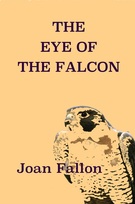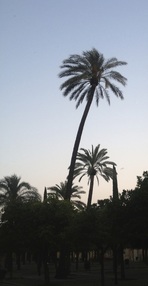It was barely light when she came to his room. The night sky was turning to milky white on the horizon but the songbirds were still asleep; even the cock had not yet begun to crow. She stood by his bed, looking down at him. Her nightdress shone and glittered in the flickering light of the night lamps; it reminded him of the kingfishers that stole in to the palace gardens to steal fish from the lakes. Gently her hand stroked his hair.
‘Hisham, my son, are you awake?’ she asked.
‘Yes mother. What’s happened? Is something the matter?’
He was well aware of the commotion in the women’s quarters; the wailing and crying, the sound of heavy footsteps as the guards marched through the palace, the slamming of doors and loud voices all spoke of some catastrophe. It had broken into his sleep and woken him before his mother arrived at his bedside. Now she knelt by his side and said, ‘You must get up, Hisham. The Khalifa is dead.’
Dead? Baba was dead? He felt a chill pass over him and hot tears sprang into his eyes. He looked at his mother; her face was impassive, not a tear marred her beautiful face. She pulled the covers off him and took his hand in hers.
‘Do not cry, Hisham; there is no need for tears. You are the Khalifa now, my son. You will be a great and glorious ruler,’ she continued, her eyes gleaming, ‘like the Omeyyads before you. Al-Andalus will thrive and prosper with you as Khalifa and with me by your side.’
She bowed low so that her face touched the carpet next to his bed, her long blonde hair cascading over the elaborately woven silks, and would have kissed his hand but he snatched it away. Baba was dead. Who was this woman who did not weep for her dead husband? He had seen her shed more tears when her pet peacock died.
He turned his face away from her. Was she telling him the truth? Was Baba really dead? His father had been unwell for some time, confined to his rooms, only able to walk a few steps at a time, but Hisham had never really expected him to die. He was sure he would get better. He believed the doctors who came each day and gave him potions made from habba souda and warm milk, said by the Prophet to cure everything but death, who made him infusions of anise and applied myrrh to his lips to sweeten his breath, who massaged his legs and prescribed salt water baths. He believed them when they said that with time he would recover, that he would return to his books and be as he was before. But they had been wrong. Baba had not recovered from the affliction that had twisted his face and stolen the strength from his limbs. He had lain in his room surrounded by his ministers, listening silently while they told him what was happening in his kingdom. Then, tired from his inability to do anything, he had sent for Hisham and asked him to read to him.
What would Hisham do now? He had loved his father. Al-Hakim had been more than a father; he had been Hisham’s friend and his teacher. Each day, when his father had finished with the business of the court, he went into the harem to look for his son and together they walked in the palace gardens while he recited the great Persian poetry of times past. He recounted the exploits of his father, Hisham’s grandfather, the mighty al-Rahman III, who had died before the boy was born, of how he had subdued all the rebellious tribes and united al-Andalus into the most powerful kingdom in Europe, of how he had defeated the Christian princes yet allowed Christians, Jews and Moslems to live in peace, side by side. Hisham had listened to his stories and was proud to be part of such a powerful family. On other occasions he accompanied his father to the great library, al-Hakim’s pride and joy, and there he learnt the secrets that were held within his countless books, sharing his father’s excitement when a new manuscript arrived from some distant land or a copyist presented him with something fresh to read and explore. Hisham loved to trace his finger over the beautiful illuminated characters and follow the words across the page or watch as books in Latin or Greek were carefully translated into Arabic. His father had taught him many things it was true, but Hisham was not sure that he had taught him how to be Khalifa of Muslim Spain.
‘Hisham, you must get up, the ministers are waiting to see their new Khalifa. Come child, I know you are upset at the news but you have responsibilities now,’ his mother whispered so that his attendants could not hear her.
He looked at her and wished he could just pull the covers over his head and stay there until she went away but he knew he could not. Queen Subh umm Walad was not someone to be easily ignored; she was as fearsome as she was beautiful.
His mother stood up and clapped her hands. She looked annoyed with him. At that signal Hisham’s personal slaves hurried across to him and, reluctantly, he rolled out of bed so that they could begin to prepare him for the day. Khalifa? How could he be Khalifa? It was only a few months since he had celebrated his eleventh birthday.
‘Hisham, my son, are you awake?’ she asked.
‘Yes mother. What’s happened? Is something the matter?’
He was well aware of the commotion in the women’s quarters; the wailing and crying, the sound of heavy footsteps as the guards marched through the palace, the slamming of doors and loud voices all spoke of some catastrophe. It had broken into his sleep and woken him before his mother arrived at his bedside. Now she knelt by his side and said, ‘You must get up, Hisham. The Khalifa is dead.’
Dead? Baba was dead? He felt a chill pass over him and hot tears sprang into his eyes. He looked at his mother; her face was impassive, not a tear marred her beautiful face. She pulled the covers off him and took his hand in hers.
‘Do not cry, Hisham; there is no need for tears. You are the Khalifa now, my son. You will be a great and glorious ruler,’ she continued, her eyes gleaming, ‘like the Omeyyads before you. Al-Andalus will thrive and prosper with you as Khalifa and with me by your side.’
She bowed low so that her face touched the carpet next to his bed, her long blonde hair cascading over the elaborately woven silks, and would have kissed his hand but he snatched it away. Baba was dead. Who was this woman who did not weep for her dead husband? He had seen her shed more tears when her pet peacock died.
He turned his face away from her. Was she telling him the truth? Was Baba really dead? His father had been unwell for some time, confined to his rooms, only able to walk a few steps at a time, but Hisham had never really expected him to die. He was sure he would get better. He believed the doctors who came each day and gave him potions made from habba souda and warm milk, said by the Prophet to cure everything but death, who made him infusions of anise and applied myrrh to his lips to sweeten his breath, who massaged his legs and prescribed salt water baths. He believed them when they said that with time he would recover, that he would return to his books and be as he was before. But they had been wrong. Baba had not recovered from the affliction that had twisted his face and stolen the strength from his limbs. He had lain in his room surrounded by his ministers, listening silently while they told him what was happening in his kingdom. Then, tired from his inability to do anything, he had sent for Hisham and asked him to read to him.
What would Hisham do now? He had loved his father. Al-Hakim had been more than a father; he had been Hisham’s friend and his teacher. Each day, when his father had finished with the business of the court, he went into the harem to look for his son and together they walked in the palace gardens while he recited the great Persian poetry of times past. He recounted the exploits of his father, Hisham’s grandfather, the mighty al-Rahman III, who had died before the boy was born, of how he had subdued all the rebellious tribes and united al-Andalus into the most powerful kingdom in Europe, of how he had defeated the Christian princes yet allowed Christians, Jews and Moslems to live in peace, side by side. Hisham had listened to his stories and was proud to be part of such a powerful family. On other occasions he accompanied his father to the great library, al-Hakim’s pride and joy, and there he learnt the secrets that were held within his countless books, sharing his father’s excitement when a new manuscript arrived from some distant land or a copyist presented him with something fresh to read and explore. Hisham loved to trace his finger over the beautiful illuminated characters and follow the words across the page or watch as books in Latin or Greek were carefully translated into Arabic. His father had taught him many things it was true, but Hisham was not sure that he had taught him how to be Khalifa of Muslim Spain.
‘Hisham, you must get up, the ministers are waiting to see their new Khalifa. Come child, I know you are upset at the news but you have responsibilities now,’ his mother whispered so that his attendants could not hear her.
He looked at her and wished he could just pull the covers over his head and stay there until she went away but he knew he could not. Queen Subh umm Walad was not someone to be easily ignored; she was as fearsome as she was beautiful.
His mother stood up and clapped her hands. She looked annoyed with him. At that signal Hisham’s personal slaves hurried across to him and, reluctantly, he rolled out of bed so that they could begin to prepare him for the day. Khalifa? How could he be Khalifa? It was only a few months since he had celebrated his eleventh birthday.

The Eye of the Falcon, the second book in the al-Andalus series, is available for pre-order from Amazon now.


Recent Comments